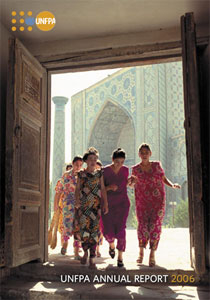News
New Annual Report Highlights Achievements of 2006
- 12 June 2007
News
UNITED NATIONS, New York – As the Executive Board of UNFPA, the United Nations Population Fund, met here today to chart the Fund’s course for the next few years, it also had the opportunity to review past accomplishments.
The UNFPA Annual Report 2006 was presented to the board at its Annual Session by UNFPA Executive Director Thoraya Ahmed Obaid.
Each chapter of the newly released report features an individual whose life was touched by the work of UNFPA last year. These include:

Kouboura Moutari of Niger, who received treatment and support for obstetric fistula with help from UNFPA and now talks to other women in her country about the importance of obstetric care.
Tarcila Rivera Zea, who coordinates a network of indigenous women in Peru and is now expanding her work throughout the region with UNFPA support.
Khadija, born to Moroccan migrants in the Netherlands, was one of the ten young people whose experiences were chronicled in Moving Young, the first Youth Supplement to the State of World Population report.
Nazia, a 19-year-old who lost most of her family in the 2005 earthquake in Pakistan, was able to receive obstetric care at a new UNFPA-supported maternity centre. Now mothers and children in some of the areas hardest hit by the disaster enjoy better access to health care than before.

The report highlights UNFPA’s efforts throughout the year assisting 154 developing and transition countries and territories to reduce maternal death, promote HIV prevention, and address unmet needs for family planning.
During 2006, the Fund also promoted effective population policies to alleviate poverty and to empower women and men to make the choices necessary to improve their lives and those of their families. And it broke past records in terms of resources mobilized and the number of donors providing support.
Read more about the specific ways in which UNFPA worked throughout 2006 to ensure that every pregnancy is wanted, every birth is safe, every young person is free of HIV/AIDS, and every girl and woman is treated with dignity and respect.
Contact information:
Omar Gharzeddine
Tel.: +1 (212) 297-5028
Email: gharzeddine@unfpa.org